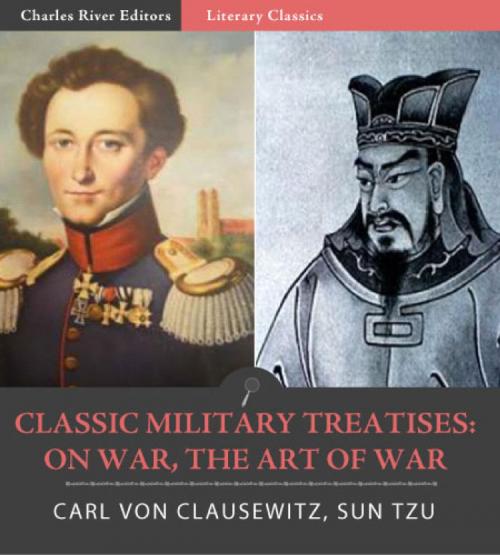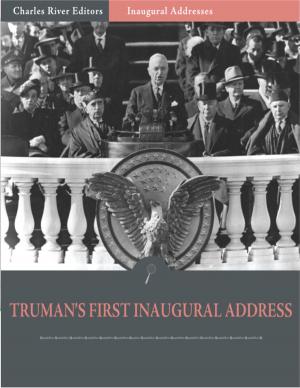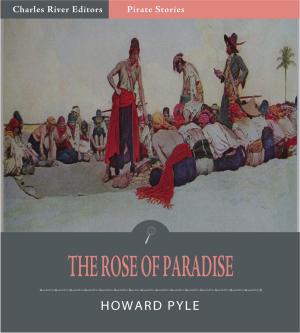Classic Military Treatises: Sun Tzus The Art of War and Clausewitzs On War (Illustrated Edition)
Nonfiction, History, Military, Strategy, Other, Ancient History| Author: | Sun Tzu & Carl von Clausewitz | ISBN: | 9781475301298 |
| Publisher: | Charles River Editors | Publication: | February 27, 2012 |
| Imprint: | Language: | English |
| Author: | Sun Tzu & Carl von Clausewitz |
| ISBN: | 9781475301298 |
| Publisher: | Charles River Editors |
| Publication: | February 27, 2012 |
| Imprint: | |
| Language: | English |
Military treatises have long fascinated readers, even those who are not professional military men, and people in other fields have long sought to apply the lessons learned in military treatises to other walks of life. Among the worlds military treatises, without question two of the most famous and influential are Sun Tzus The Art of War and Carl von Clausewitzs On War, written over 2,000 years apart but containing similar and useful advice for readers, and still staples of literature for people who serve in the armed forces. Sun Tzu is one of the most famous authors in history, and The Art of War remains the most famous military treatise ever written, but it is unclear whether the man himself ever existed. That said, historians believe the man did exist, and that the famous treatise was written for King Ho Lu, who Sun Tzu may have served as a general in the 5th or 6th century B.C. The military maxims, while timeless, do not refer to any concrete time in history. This compilation of the original, unabridged edition, along with the annotated edition translated by Lionel Giles, includes dozens of images. With the exception of Napoleon Bonaparte, no man was more influential on the military tactics and strategy of 19th century warfare than Carl Philipp Gottfried von Clausewitz (June 1, 1780 November 16, 1831). Clausewitz was a Prussian soldier and German military theorist who stressed the moral and political aspects of war, but he is remembered today for his military treatise On War, which remains one of the most important military treatises ever written. It was mandatory for all military students and officers to read during the 19th century, and it was common practice for generals during the Civil War to carry Clausewitzs treatise and read it to assist them in strategy and tactics. On War covered every conceivable facet of warfare, using historical battles as examples of what to do and what not to do. The treatise discusses how opposite forces interact, and how unexpected new developments unfolding under the "fog of war" called for rapid decisions by alert commanders. In opposition to Antoine-Henri Jomini, he argued war could not be quantified or graphed or reduced to mapwork and graphs. Perhaps most importantly, Clausewitz realized the correlation between politics and war. Clausewitz had many aphorisms, of which the most famous is, "War is not merely a political act, but also a political instrument, a continuation of political relations, a carrying out of the same by other means. This view of warfare is still the standard viewpoint of war today.. This edition of the two classic military treatises is specially formatted with a Table of Contents covering each volume and all chapters.
Military treatises have long fascinated readers, even those who are not professional military men, and people in other fields have long sought to apply the lessons learned in military treatises to other walks of life. Among the worlds military treatises, without question two of the most famous and influential are Sun Tzus The Art of War and Carl von Clausewitzs On War, written over 2,000 years apart but containing similar and useful advice for readers, and still staples of literature for people who serve in the armed forces. Sun Tzu is one of the most famous authors in history, and The Art of War remains the most famous military treatise ever written, but it is unclear whether the man himself ever existed. That said, historians believe the man did exist, and that the famous treatise was written for King Ho Lu, who Sun Tzu may have served as a general in the 5th or 6th century B.C. The military maxims, while timeless, do not refer to any concrete time in history. This compilation of the original, unabridged edition, along with the annotated edition translated by Lionel Giles, includes dozens of images. With the exception of Napoleon Bonaparte, no man was more influential on the military tactics and strategy of 19th century warfare than Carl Philipp Gottfried von Clausewitz (June 1, 1780 November 16, 1831). Clausewitz was a Prussian soldier and German military theorist who stressed the moral and political aspects of war, but he is remembered today for his military treatise On War, which remains one of the most important military treatises ever written. It was mandatory for all military students and officers to read during the 19th century, and it was common practice for generals during the Civil War to carry Clausewitzs treatise and read it to assist them in strategy and tactics. On War covered every conceivable facet of warfare, using historical battles as examples of what to do and what not to do. The treatise discusses how opposite forces interact, and how unexpected new developments unfolding under the "fog of war" called for rapid decisions by alert commanders. In opposition to Antoine-Henri Jomini, he argued war could not be quantified or graphed or reduced to mapwork and graphs. Perhaps most importantly, Clausewitz realized the correlation between politics and war. Clausewitz had many aphorisms, of which the most famous is, "War is not merely a political act, but also a political instrument, a continuation of political relations, a carrying out of the same by other means. This view of warfare is still the standard viewpoint of war today.. This edition of the two classic military treatises is specially formatted with a Table of Contents covering each volume and all chapters.















